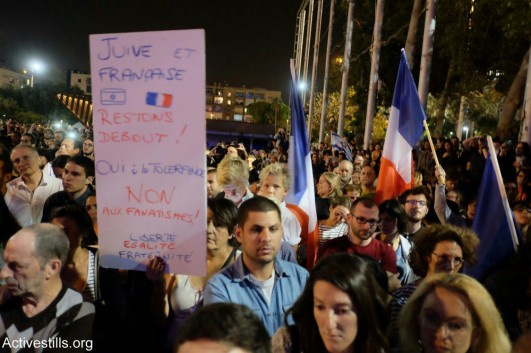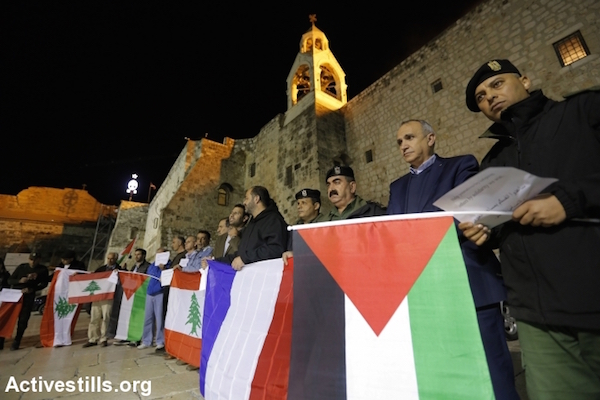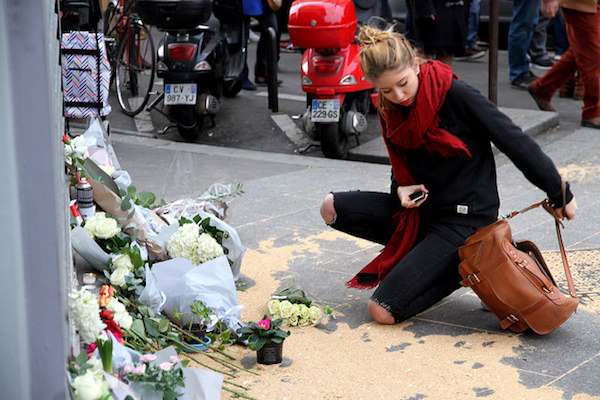Suggestions that terrorism in Paris springs from the same well as terrorism in Israel are misleading and dangerous. Erasing complexity may be a comfort in difficult days like these, but conflating the varying causes of violence won’t help us end it.

There are troubled currents flowing from unlikely sources these days. Terror attacks have continued to mar Iraq, Lebanon, Nigeria, Yemen, Mali and others over the past two weeks, but the global chatter surrounding such events increased disproportionately with the attacks in France. Suddenly, two of Europe’s major capitals – Paris and Brussels – started receiving the kind of attention usually reserved for genuine conflict zones.
As someone who was born in Brussels to a French mother and who now lives in Israel-Palestine, it has been a particularly complex fortnight. For my country of residence has, too, been witnessing a spike in violence – albeit of a very different nature to that which has again turned up at Europe’s door.
So it has been with anguish that I have followed the current events and with troubled curiosity that I have watched commentators try to draw connections between the tensions in my countries of birth, residence and heritage. Under the guise of attempting to arrange the current wave of global violence into some kind of cohesive narrative, and with the debate on terrorism at saturation point, many observers of the Israel-Palestine conflict have seized on the opportunity to situate the bloodshed here as springing from the vaguely-defined, amorphous phenomenon of “global jihad” or “militant Islam.”
This line of reasoning posits Islamic State, Hamas and lone-wolf attackers on the streets of Israel-Palestine within the same nexus of expansionist religious fanaticism and has been adopted enthusiastically in Israel, from Prime Minister Benjamin Netanyahu downward.
A prominent example of this unfortunate trend occurred last Thursday, when five people were killed in Tel Aviv and the West Bank in two separate attacks perpetrated by Palestinians. The killings took place exactly a week after the Paris attacks and marked the latest and, for Israelis, bloodiest day in a six-week stretch of heightened violence on both sides of the Green Line.

As is customary, people took to social media to voice their reactions, with countless Israelis and Jews in the diaspora – politicians and the general public alike – positioning the terror attack in Tel Aviv within the same framework as those in France. Ignoring the national-political dimensions of the violence in Israel-Palestine, many simply attributed the killings to Islamist extremism.
Absent from these assertions was any suggestion that the unique contours of the situation here – i.e. occupation, acute oppression and dispossession of Palestinians and a uniformly brutalized society – may be fertile ground for political violence. This attitude is perfectly embodied in the statements Deputy Foreign Minister Tzipi Hotovely made on Sunday, in which she claimed that “the settlement enterprise is the front line in the fight against global jihad.”
Domestically this approach is worrying, because it whitewashes the occupation and seeks to obviate the need for Israelis – and particularly the Israeli government – to look inwards. Without condoning or justifying the violence, there is nonetheless an urgent need for Israel to come to terms with the role that successive governments have played in cultivating the conditions for unrest.
But the implications of reassigning the roots of Israel-Palestine’s problems reach beyond our own borders. Firstly, it contributes to the broad trend of stigmatizing Muslims and treating Islam as inherently problematic, instead of trying to understand the exogenous causes of radicalization.
Secondly, it ignores the impact of the West’s frequently ruinous military adventurism in the Middle East and the fundamental role this has played in giving rise to violent groups with international designs. Islamic State, the latest and most gratuitously perverse of the lot, arose in large part due to a vacuum created by geopolitical developments that have little to do with Israel and Palestine.
Bunching terror attacks on the streets of Israel-Palestine with those in Europe also glosses over socio-political dynamics specific to Belgium and France, whose respective issues resemble each other far more closely.
Belgium, in spite of its reputation as a weekend-break haven, is a deeply divided country with a police force that seems to harbor a well-embedded tendency to overlook criminal activity going on under its nose. The country has long been a home for shady arms deals. A sustained period of terror attacks against civilians by a neo-Nazi gang and systematic police failings in the case of a serial child abductor and murderer were issues that marred Belgium when I was living there in the mid-1980s and again in the early 1990s. Additionally, Belgium’s dysfunctionality as a state has pushed much of its immigrant populace to the margins.

France, meanwhile, has been threatening to explode for more than a decade. The insistence on placing “Frenchness” above all else, and consequently failing to adequately integrate its immigrant populations – particularly those from its former colonies – has fostered resentment, crime and deep societal divisions. As in Belgium, the marginalization of the country’s Muslim communities has made their youngsters soft targets for radicalization.
The context in which attacks in Israel-Palestine take place, then, is wildly different from that in France, and any attempt to cast them as springing from the same well is facile, disingenuous and deeply misleading. It is also callous to try and appropriate the suffering of anyone affected by violence – in any measure – in order to gain political capital or prove a point. It is difficult to ignore the backhanded overtones in the social media memes announcing that Paris’s 13/11 is Israel’s 24/7.
And yet the impulse to conflate the causes behind these attacks is, on a human level, understandable. While it sows fear to inflate the perceived threat of “global jihad” by attributing every terror attack everywhere to its malign influence, it is nonetheless oddly comforting to paint using broad brushstrokes. Doing so erases complexity, and complexity is the last thing anyone wants to deal with when they are frightened. It raises more questions, when all we want is answers.
But we should be striving to maintain complexity. There are no straightforward answers at a time like this, and resorting to the Procrustean bed of grand narratives will only blind us to the real causes of the very diverse problems that we face. The fact that these problems are interconnected, as my colleague Amjad Iraqi so cogently argued after Paris, does not mean that they are alike. To suggest that they are only fosters the kind of short-sightedness that has led us into this mess in the first place.
In his recent essay on Islamic State, Adam Shatz wrote that “the theatre of conflict has no clear borders.” That is certainly true, and it is a profoundly discomfiting thought. It is complex, almost incomprehensibly so. But the fact that we cannot see where the conflicts end does not mean we shouldn’t try and understand where they begin.

